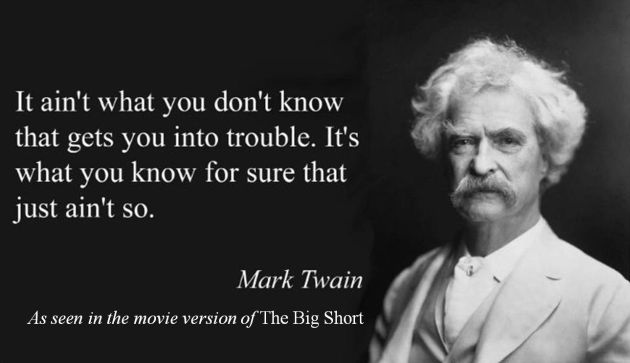Between Eight WYSINWYG Terms In Finance – Part 1 and Eight WYSINWYG Terms In Finance – Part 2, we covered eight terms in finance that should not be taken literally i.e. they’re WYSINWYG (“What You See Is Not What You Get” – to be pronounced “wisinwig”). To recap, they were:
- Nonprofit Company
- Winner Takes All
- Banking the Unbanked
- Too Big To Fail
- Market Manipulation / Pump and Dump
- Insider Trading
- Know Your Customer
- Maximum Retail Price
You might have noticed that there’s a lot of hair splitting in finance.
Let’s take “Pump and Dump” as an example:
Pump and dump is when you purchase the stock with the sole intention of increasing its price in order to cash out of another position that yields a profit only if the stock price goes up.
I really don’t know how anyone can objectively judge whether you bought the share to pump and dump or just to sell it at a higher price. As Matt Levine says in his Bloomberg essay titled Trying to Buy Stuff You Want Is Not Manipulation:
“Market manipulation” is a famously hard-to-define term. In casual usage, people often use it to mean doing stuff that tends to push the price of a thing up or down, but it can’t really mean that: Any time you buy or sell a thing, that will affect its price, and surely not all trading is manipulation. In practice, manipulation seems to have two elements:
- Buying or selling a thing, or bidding or offering to buy or sell the thing, in a way that tends to push its price up or down;
- In a way that a regulator doesn’t like.
Still that is a little underdetermined. Sometimes a regulator will just be wrong!
Let’s see whether the regulator is right or wrong when SEC’s lawsuit against Archegos and its Founder for market manipulation goes to trial. Spoiler Alert: It will involve a lot of hair splitting.
Hair splitting scales new heights when it involves Regulatory Gap.
“Regulatory Gap” is something that lies in the twilight zone between “Not Legal” and “Not Illegal”. This is how these startups interpret these terms:
- “Not Legal” means there’s no law on it.
- “Not Illegal” means it does not violate any existing laws.
- “Not Illegal” does not mean “Legal” and “Not Legal” does not mean “Illegal”.
To put it colloquially, Regulatory Gap is something that’s neither permitted nor banned by law.
We talked here about a slew of new BNPL fintechs that have expanded the supply of credit in India and thereby “credited the uncredited”.
The banking regulator’s recent Reg PPI rule banned uploading of credit lines into nonbank PPI accounts. When it was announced, Reg PPI cast a shadow on the operating models of these BNPL startups. However, I predicted that they’re smart enough to figure out ways to beat this existential threat, as unicorns in ecommerce, epharmacy, rideshare, and other regulated industries have done in the past.
Online sale of medicine is apparently banned in India but that doesn't seem to have stopped a couple of Indian ePharmacy startups from becoming unicorns. #GoFigure .https://t.co/uRjTOOxnGd .#RegulatoryGap pic.twitter.com/BxEGbC80mO
— Ketharaman Swaminathan (@s_ketharaman) July 5, 2021
Indeed, they have – by invoking the difference between Partial KYC and Full KYC.
Partial KYC v Full KYC, etc.
There will be more hair splitting, not less.
"We'll continue to operate till there's clarity" is also straight out of regulated industry startup playbook e.g. Uber in London, Rapido in Pune. pic.twitter.com/ImwakPG8N2— Ketharaman Swaminathan (@s_ketharaman) June 29, 2022
This has led to more – not less – hair splitting.
Interestingly, until Reg PPI came into force, I don’t recall these startups saying that they were only doing partial KYC.
We’ve seen eight terms in finance that don’t quite mean what they say.
I’ll be bold as to cite some of them – Nonprofit Company and Insider Trading – as canonical examples for the following quote:
Michael Lewis fans will recall that the movie version of his bestseller The Big Short opens with the above line.
But it’s not only in finance. Some other fields also abound in terms that should not be taken literally. For example, product management.
Product management language is, like most business jargon, full of terms that have a little inside-joke feel to them.
– @jproco
With Google being the source of truth for an overwhelming majority of people on the planet, we’re in for interesting times when the search behemoth does not get the difference between what terms say and what they mean.
At the risk of committing sacrilege, insider trading is a bit more nuanced than Google Featured Snippet or #1 result on Google SERP.https://t.co/6cXLivPOpM
— Ketharaman Swaminathan (@s_ketharaman) April 13, 2022
DISCLAIMER: This post is not legal or financial advice.
